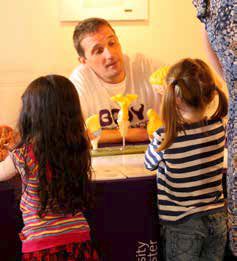
Physiology News Magazine
The impact of engaging
News and Views
The impact of engaging
News and Views
Lewis Dean
Outreach Officer, The Physiological Society
https://doi.org/10.36866/pn.90.12

Increasingly, researchers are being asked to describe the economic and societal impacts of their work, alongside the academic goals. With the impact of ‘impact’ on funding decisions and career progression looking set to grow still further, one important, measurable societal impact is public engagement.
There are plenty of phrases that are used to describe what I am talking about – ‘science communication’, ‘public engagement’, ‘science outreach’, ‘informal science learning’ – and each does have its own nuanced definition, referring to different approaches or methods. What these phrases have in common (and what this article is about) is the broadest idea: getting out there and interacting with people.
However, engaging with public audiences is about more than just funding proposals. Stuart Allan, University of Manchester, has been involved in a wide variety of public engagement projects. He explains, “If we want to gain public support for the most recent advances and importance of science to society then we must have scientists willing to go out and talk about it”. Engagement is a two-way process; Charlotte Haigh, University of Leeds, approaches it as, “Inspiring anyone who is interested in what physiology research is about and very much listening to their stories.”
“We must be willing to take on board the views of the public,” says Stuart. Whilst many of us are happy to agree that science is important to society, we must also acknowledge that society affects how we do our science (Stillgoe, 2009).
There are plenty of opportunities available to get involved with engagement. Some may appeal to you, others may not; Lauren Hughes, University of Bristol, advises, “Just be yourself and get involved in the public engagement activities that you are passionate about”.
Engagement is meant to be a rewarding, enriching and educating experience for all parties involved, including the academics. Recently The Society sponsored four Bright Club evenings – stand-up comedy performed by academics. Devised at UCL and now run in towns across the country, the aim is to bring researchers together with 20-40 year olds, who have no existing contacts with academia, in a venue outside a university. But it’s clearly not for everyone; whilst some may jump at the chance to do several minutes of jokes about their research, for others it probably sounds like torture.
Alongside her teaching role at Bristol, Lauren Hughes has helped develop and deliver hands-on physiology experiments in the Mobile Teaching Unit (MTU), a heavy goods vehicle that converts into a science classroom. With colleagues and students she travels to schools and colleges nationally and attends a number of science festivals. The MTU is a large capital investment, but there are many smaller projects also engaging with public audiences. In October Charlotte Haigh and colleagues ran a stand in a local shopping centre, taking the blood pressure of members of the public, explaining the results with models and posters, and answering questions. The ‘Brain Bus’ project devised by Stuart Allan and colleagues has run in schools, libraries and train stations across Manchester; as Stuart puts it, “Take the science to the public, rather than the public coming to the science”.
So how do you start? Charlotte Haigh is clear: “Don’t be afraid, just do it!” Whilst it can seem daunting, remember there are plenty of activities already out there that you can get involved with. If you want to devise your own activity, speak to people who have some experience running events. Remember that The Society offers grants and we can advise on project design. If you want to hear about the events that we are carrying out and other relevant opportunities, you will soon be able to update your profile online to include your engagement interests or you can email me. I urge you to have a go, because, as Charlotte Haigh puts it, “When you see that first face light up because they are interested in what you have said, there will be no turning back, you’ll be thinking of what else you could inspire them with!”
References
‘Pathways to Impact’ RCUK website http://www.rcuk. ac.uk/kei/impacts/Pages/meanbyimpact.aspx. Accessed 24 Jan 2013
Stilgoe, J. (2009). Citizen Scientists. Reconnecting Science with Civil Society. Demos

